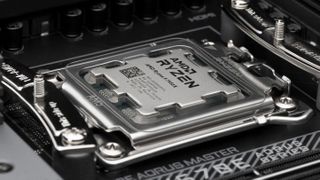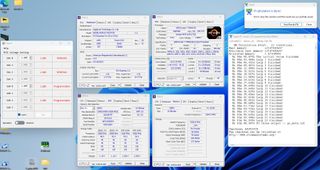
How AMD Achieved Significant Memory Overclocking Enhancements Through Internal Optimizations

Thrilling Breakthrough in PC Performance: DDR5 Memory Hit 9058MHz with Ryzen Clockwork - Latest BIOS Update Secrets Revealed
Just days after AMD released its new memory-enhancing AGESA 1.0.0.7b update, HiCookie, one of the world’s best-known overclockers, has managed to hitover 9000 MHz on one of his DDR5 memory kits operating on a Ryzen 7 7800X3D system.
This is one of the fastestDDR5 overclocks we’ve seen to date on any DDR5-supported platform, demonstrating that AM5 has a lot more DDR5 overclocking potential than initially expected. At this rate, we could see 10,000 MHz overclocks in no time — and we might even see Ryzen 7000 systems actively beating Intel’s best Alder Lake/Raptor Lake CPUs inmemory overclocking for the first time ever.
The overclock was achieved with Gigabyte DDR5-8400 modules on aB650E Aorus Tacyon motherboard with aRyzen 7 7800X3D CPU . The DDR5 modules were overclocked to 9058 MHz with slightly tighter 54-56-56-126 timings compared to the module’s default XMP configuration.

(Image credit: Facebook - Chihhua Ke)
The newAGESA 1.0.0.7b update is arguably the most impactful AMD microcode update we’ve seen on the AM5 platform to date. The new patch substantially increases memory support (and memory stability, by the looks of it), allowing most Ryzen 7000 CPUs to hit 7000 - 8000 MHz regularly and 6400 MHz in a 1:1 UCLK:MEMCLK ratio, which is optimal for gaming and other latency-sensitive tasks. This is a substantial change from previous patches, where 6000 MHz was the peak most Ryzen 7000 chips could hit stably. Anything beyond 6000 MHz was completely unpredictable.
LATEST VIDEOS FROM tomshardware Tom’s Hardware
The new update has a lot of new features that enhancememory stability and boost frequency support, but the primary change that improves higher-frequency DDR5 functionality is a new set of previously-hidden timing parameters that control the Ryzen 7000 memory controller. These settings were hidden from the user in the past — and possibly motherboard manufacturers as well — but now they have opened them up to users and BIOS developers to alleviate any bottlenecks the memory controller might be responsible for.
If overclockers continue to push memory overclocks like this with AMD’s new AGESA microcode update, this may be the first real competition we’ve seen from AMD regarding memory overclocking. Past AMD Ryzen architectures have always hadinferior memory overclocking performance , due to the hardware limitations of their memory controllers, compared to Intel. But now it seems like the tables may be turning, and AMD may even have the better-performing memory controller. We’ll know this soon enough if memory overclockers start breakingDDR5 frequency world records on AMD hardware.
Stay On the Cutting Edge: Get the Tom’s Hardware Newsletter
Get Tom’s Hardware’s best news and in-depth reviews, straight to your inbox.
Contact me with news and offers from other Future brands Receive email from us on behalf of our trusted partners or sponsors
By submitting your information you agree to theTerms & Conditions andPrivacy Policy and are aged 16 or over.
Also read:
- [New] Elevate Your Typography with Affects' Best-in-Class Plug-Ins for 2024
- [New] Perfecting Your Video Content for Instagram Feed for 2024
- [Updated] How Can You Make Outstanding YouTube Outro?
- Cyber Monday Steals: Snag the Lenovo ThinkPad L14 Gen 3 at an Unbeatable 77% Discount - In Stock Now!
- Download & Install Canon MF743CDW Printer Drivers Compatible with Windows OS
- Effortless Setup for Your Logitech M1 Cu 2023 with Updated Driver Downloads
- Find & Install the Right Toshiba Driver: Your Ultimate Windows Solution
- Free Download: Ultimate Guide to Using Behringer USB Audio Interface
- How to Wipe iPhone 12 Pro Data Permanently? | Stellar
- In 2024, Seamless Navigation to Your Individual Playlist Library on YouTube
- Install the Newest NVIDIA Drivers for Your GeForce RTX 3080 on Windows 11/8/7 Systems
- Latest HP Officejet Pro 8610 Drivers: Free Downloads for Win10/Win8/Win7/XP/Vista
- Rise in Search Results Mastering Podcast SEO for 2024
- RTX 2060 Super Graphics Card Drivers - Compatible with Windows 11
- Six Websites Where YouTube Imagery Breaks the Mould for 2024
- Ways to stop parent tracking your Vivo X100 | Dr.fone
- Title: How AMD Achieved Significant Memory Overclocking Enhancements Through Internal Optimizations
- Author: Richard
- Created at : 2025-01-31 22:39:35
- Updated at : 2025-02-01 18:55:23
- Link: https://hardware-updates.techidaily.com/how-amd-achieved-significant-memory-overclocking-enhancements-through-internal-optimizations/
- License: This work is licensed under CC BY-NC-SA 4.0.